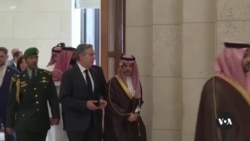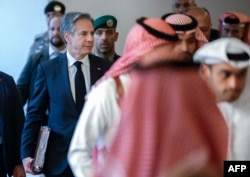U.S. Secretary of State Antony Blinken expressed determination Wednesday to achieve a cease-fire between Israel and Hamas that includes the release of hostages Hamas is holding in Gaza, and said the only reason that goal would not be achieved “is because of Hamas.”
“There is a proposal on the table, and as we’ve said, no delays, no excuses, the time is now,” Blinken said as he met with Israeli President Isaac Herzog in Tel Aviv.
Blinken said the meeting would also include discussion of humanitarian aid for Gaza.
“At the same time, even as we’re working with relentless determination to get the cease-fire that brings the hostages home, we also have to be focused on people in Gaza who are suffering in this crossfire of Hamas’ making.”
The top U.S. diplomat has repeatedly called on Hamas to accept the cease-fire proposal during a trip to the region that included earlier stops in Saudi Arabia and Jordan.
Herzog said the return of hostages held by Hamas “is and should be the top priority of the international community.”
Following the meeting, Blinken spoke with demonstrators outside who held signs and chanted slogans calling for the hostages in Gaza to be brought home.
Blinken told the demonstrators he had met with families of the hostages and told them, “Bringing your loved ones home is at the heart of everything we’re trying to do.”
Hamas is believed to still be holding about 100 hostages, along with the remains of about 30 others, after taking around 250 people hostage in the October 7 attack on Israel in which the militants killed 1,200 people.
Israel’s counteroffensive in Gaza has killed more than 34,500 people, about two-thirds of them women and children, according to the health ministry in Gaza.
Blinken met Tuesday with Jordanian Foreign Minister Ayman Safadi and King Abdullah II, before meeting with Sigrid Kaag, U.N. senior humanitarian and reconstruction coordinator for Gaza.
Blinken thanked Abdullah for Jordan’s leadership in facilitating the delivery of humanitarian aid, including joint U.S.-Jordan airdrops that to date have delivered more than 1,000 tons of humanitarian assistance to Palestinians in Gaza.
The two leaders discussed joint efforts to expedite the flow of additional urgently needed aid to Gaza from Jordan through land routes. Blinken also commended the king’s commitment to economic modernization and vital public sector reforms.
Later Tuesday, Blinken met with Palestinians from Gaza at the Office for the Coordination of Humanitarian Affairs before meeting with Kaag. Blinken told Kaag he was anxious to hear directly from her, adding, “The entire team is doing extraordinary work to ensure that people in Gaza get the help and support and the assistance they need.”
US, Saudi talks
In Riyadh earlier this week Blinken said the United States is close to finishing a security agreement with Saudi Arabia that would be offered if the country makes peace with Israel.
“The work that Saudi Arabia, the United States have been doing together in terms of our own agreements, I think, is potentially very close to completion,” Blinken told an audience at the World Economic Forum on Monday.
He added the two nations have done intensive work together over the last month on Israeli-Saudi normalization.
Blinken disclosed that he was scheduled to be in Saudi Arabia and Israel on October 10 last year to focus specifically on the Palestinian part of the normalization deal because that is an essential component. But it did not happen because of the Hamas terror attack on Israel.
“In order to move forward with normalization, two things will be required: Calm in Gaza and a credible pathway to a Palestinian state,” Blinken said.
U.S. officials have said creating a pathway to a Palestinian state with security guarantees for Israel is key to lasting peace and security in the Middle East and to Israel's integration in the region.
The Saudis have demanded, as a prerequisite, to see an Israeli commitment to the two-state solution.
Israeli Prime Minister Benjamin Netanyahu has rejected the two-state solution and the return of the Palestinian Authority to control Gaza, demands that are widely supported by the international community.
Nimrod Goren, a senior fellow for Israeli affairs at the Middle East Institute, told VOA in an email, “Saudi Arabia has been gradually opening towards Israel for a decade. Significant progress was made in the months prior to the Hamas attack of October 7, with the hope of linking an Israeli-Saudi normalization agreement to a pre-presidential election, U.S.-Saudi defense pact. The war stalled the process, but talks are continuing and are at a decisive phase.”
If Netanyahu's opposition to the two-state solution remains unchanged, Goren added, he might struggle to secure normalization with Saudi Arabia.
VOA’s Cindy Saine contributed to this report.














